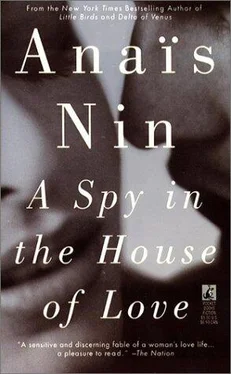“I have to talk to you, Djuna… I can’t sleep…”
“I tried to find you when I came from Paris. You change your address so often, and even your name.”
“You know I’ve always wanted to break the molds which life forms around one if one lets them.”
“Why?”
“I want to trespass boundaries, erase all identifications, anything which fixes one permanently into one mold, one place, without hope of change.”
“This is the opposite of what everyone usually wants, isn’t it?”
“Yes, I used to say that I had housing problems: mine was that I didn’t want a house. I wanted a boat, a trailer, anything that moved freely. I feel safest of all when no one knows where I am, when for instance, I’m in a hotel room where even the number is scratched off the door.”
“But safe from what?”
“I don’t know what I’m saving from detection, except perhaps that I’m guilty of several loves, of many loves instead of one.”
“That’s no crime. Merely a case of divided loves!”
“But the lies, the lies I have to tell… You know, just as some criminals tell you: ‘I never found a way to get what I wanted except by robbery,’ I often feel like saying: ‘I have never found a way to get what I wanted except by lies.’”
“Are you ashamed of it?”
Sabina grew frightened again. “There comes a moment with each man, in each relationship, when I feel lonely.”
“Because of the lies?”
“But if I told the truth I would be not only lonely but also alone, and I would cause each one great harm. How can I tell A that for me he is like a father.”
“That’s why you deserted him over and over again as one must desert the parent, it’s a law of maturity.”
“You seem to exonerate me.”
“I’m only exonerating you in relationship to Alan, toward whom you acted like a child.”
“He is the only one I trust, the only one whose love is infinite, tireless, all-forgiving.”
“That’s not a man’s love you are describing, and not even a father’s love. It’s a fantasy-father, an idealized father once invented by a needy child. This love you need, Alan has given you. In this form of love you are right to trust him. But you will lose him one day, for there are other Alans exactly as there are other Sabinas, and they too demand to live and to be matched. The enemy of a love is never outside, it’s not a man or woman, it’s what we lack in ourselves.”
Sabina’s head had fallen on her chest in a pose of contrition. “You don’t believe that this man is here to arrest me?”
“No, Sabina, that is what you imagine. It is your own guilt which you have endowed this man with. You probably see this guilt mirrored in every policeman, every judge, every parent, every personage with authority. You see it with others’ eyes. It’s a reflection of what you feel. It’s your interpretation: the eyes of the world on your acts.”
Sabina raised her head. Such a flood of memories submerged her and hurt her so deeply she was left without breath. She felt such pain. It was like the pain of the “bends” felt by deep sea divers when they come to the surface too quickly.
“In your fabricated world, Sabina, men were either crusaders who would fight your battles for you, or judges continuing your parents’ duties, or princes who had not yet come of age, and therefore could not be husbands.”
“Free me,” said Sabina to the lie detector. “Set me free. I’ve said that to so many men: ‘Are you going to set me free?’” She laughed. “I was all ready to say it to you.”
“You have to set yourself free. That will come with love…” said the lie detector.
“Oh, I’ve loved enough, if that could save one. I’ve loved plenty. Look at your notebook. I’m sure it is full of addresses.”
“You haven’t loved yet,” he said. “You’ve only been trying to love; beginning to love. Trust alone is not love, desire alone is not love, illusion is not love, dreaming is not love. All these were paths leading you out of yourself, it is true, and so you thought they led to another, but you never reached the other. You were only on the way. Could you go out now and find the other faces of Alan, which you never struggled to see, or accept? Would you find the other face of Mambo which he so delicately hid from you? Would you struggle to find the other face of Philip?”
“Is it my fault if they only turned one of their faces towards me?”
“You’re a danger to other human beings. First of all you dress them in the costume of the myth: poor Philip, he is Siegfried, he must always sing in tune, and be everlastingly handsome. Do you know where he is now? In a hospital with a broken ankle. Due to immobility he has gained a great deal of weight. You turn your face away, Sabina? That was not the myth you made love to, is it? If Mambo stopped drumming to go home and nurse his sick mother, would you go with him and boil injection needles? Would you, if another woman loved Alan, would you relinquish your child’s claims upon his protectiveness? Will you go and make of yourself a competent actress and not continue to play Cinderella for amateur theatres only, keeping the artificial snow drop which fell on your nose during the snow storm long after the play is over as if to say: ‘For me there is no difference at all between stage snow and the one falling now over Fifth Avenue’? Oh Sabina, how you juggled the facts in your games of desire, so that you might always win. The one intent on winning has not loved yet!”
To the lie detector Sabina said: “And if I did all you ask of me, will you stop haunting my steps, will you stop writing in your notebook?”
“Yes, Sabina. I promise you,” he said.
“But, how could you know so much about my life…”
“You forget that you invited me yourself to shadow you. You endowed me with the power to judge your acts. You have endowed so many people with this power: priests, policemen, doctors. Shadowed by your conscience, interchangeable, you felt safer. You felt you could keep your sanity. Half of you wanted to atone, to be freed of the torments of guilt, but the other half wanted to be free. Only half of you surrendered, calling out to strangers: ‘Catch me!’ while the other half sought industriously to escape final capture. It was just another one of your flirtations, a flirtation with justice. And now you are in flight, from the guilt of love divided, and from the guilt of not loving. Poor Sabina, there was not enough to go around. You sought your wholeness in music… Yours is a story of non-love… And do you know Sabina, if you had been caught and tried, you would have been meted out a less severe punishment than you mete out to yourself. We are much more severe judges of our own acts. We judge our thoughts, our secret intents, our dreams even… You never considered the mitigating circumstances. Some shock shattered you and made you distrustful of a single love: You divided them as a measure of safety. So many trap doors opened between the night club world of Mambo, to the Vienna-before-the-war of Philip, to the studious world of Alan, or the adolescent evanescent world of Donald. Mobility in love became a condition for your existence. There is nothing shameful in seeking safety measures. Your fear was very great.”
“My trap doors failed me.”
“Come with me, Sabina.”
Sabina and Djuna went up to her studio, where they could still hear the drumming.
As if to silence it, Djuna placed a record in her phonograph.
“Sabina…” But no words came as one of Beethoven’s Quartets began to tell Sabina, as Djuna could not, of what they both knew for absolute certainty: the continuity of existence and of the chain of summits, of elevations by which such continuity is reached. By elevation the consciousness reached a perpetual movement, transcending death, and in the same manner attained the continuity of love by seizing upon its impersonal essence, which was a summation of all the alchemies producing life and birth, a child, a work of art, a work of science, a heroic act, an act of love. The identity or the human couple was not eternal but interchangeable, to protect this exchange of spirits, transmissions of character, all the fecundations of new selves being born, and faithfulness only to the continuity, the extensions and expansions of love achieving their crystallizations into high moments and summits equal to the high moments and summits of art or religion.
Читать дальше












